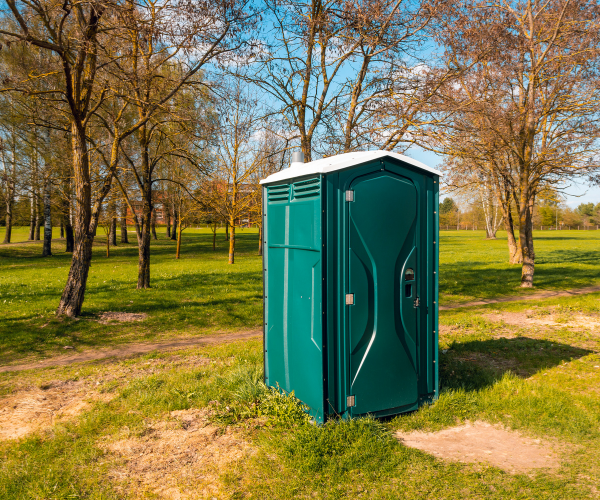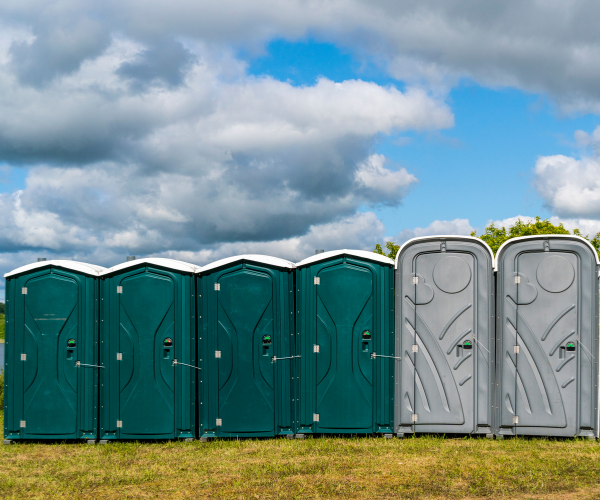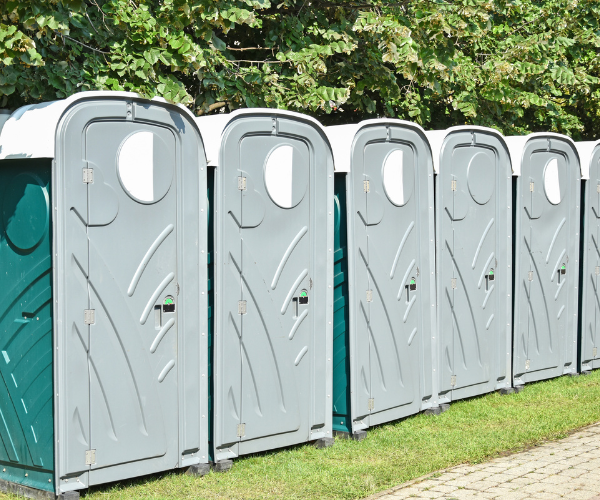Portable toilets offer numerous eco-friendly advantages that contribute to environmental sustainability and conservation of natural resources. These units are designed to operate without the use of traditional plumbing systems, significantly reducing water consumption compared to standard toilets. Traditional toilets use between 1.6 and 3.5 gallons of water per flush, while portable toilets utilize innovative designs that do not require regular flushing with potable water. This conservation measure is particularly vital in areas prone to droughts or where water resources are limited. Additionally, portable toilets help manage waste more effectively by containing it within sealed compartments until it can be collected and treated at a centralized location. This containment reduces the risk of contaminants leaching into the soil and local water supplies, thereby protecting local ecosystems and preserving biodiversity. Furthermore, the waste collected from portable toilets can be processed in facilities that convert it into usable biogas, promoting renewable energy use. Most portable toilet providers use non-toxic, biodegradable chemicals for odor control and sanitation purposes. These chemicals prevent harmful pathogens from spreading, contributing to public health safety while minimizing the environmental impact of maintenance operations. The portability of these toilets further reduces the carbon footprint associated with construction as they eliminate the need for permanent installation and construction materials, ending with a smaller environmental impact overall. In addition to reduced water use and effective waste management, many of the materials used in manufacturing portable toilets, such as plastic and aluminum, are recyclable, promoting a closed-loop lifecycle. Regular cleaning and maintenance further ensure hygiene without excessive resource expenditure. Overall, portable toilets provide a sustainable sanitation solution that aligns with global trends towards reducing ecological footprints and promoting environmentally-friendly practices.

Portable Toilet Rentals in Chiefland, Florida
Call today for a free quote (352) 660-8775
Portable Toilet
Fast, Easy, & 100% Free To Get Started
25 Years Of Experience
For over 25 years, our portable toilet company has firmly established itself in the Chiefland community. We consistently deliver high-quality services, ensuring customer satisfaction with every interaction.
Commitment to Quality
In Chiefland, our portable toilet company delivers top-quality units. We uphold strict cleaning protocols and provide robust, well-maintained facilities, ensuring customer satisfaction with every rental.
Efficient & Fast Delivery
Our dedicated team delivers portable toilets swiftly and reliably throughout Chiefland. Trust us to ensure your rentals arrive on time, fully prepared to handle the sanitation needs of your event.
Reliable Portable Toilet Rentals in Chiefland
Call for a Free Quote Today
(352) 660-8775
Situated at the center of Chiefland, Florida, our portable toilet company distinguishes itself through its unwavering focus on reliability and its dedication to local ownership. Our team proudly extends services not just within Chiefland but also to the neighboring regions, catering to various events. Whether you’re planning a construction project, festival, party, or wedding, our portable toilets deliver the comfort and hygiene your guests require. As a locally owned business, we are attuned to the specific needs of our community, consistently aiming to surpass expectations with reliable service. Years of steady quality and customer satisfaction have established us as the top choice for portable toilet rentals.


Standard Portable ToiletOur standard porta john rental units are durable and reliable for any commercial build site, housing development, public works project, or remodel job.Features include dome lighting, grated floors, and an “In-Use” locking mechanism for privacy and comfort.Regularly maintained, inspected, and cleaned by FusionSite at your location.

Wheelchair Accessible RestroomsDeveloped as an alternative to full ADA-compliant restrooms, the Liberty is a spacious, wheelchair-accessible unit that can also be promoted as a family-sized restroom.Includes a patented flat-floor system for easy wheelchair access and maneuverability.Handrails, paper holder, and rotary latch are designed for simple, intuitive end-user operation.

Portable SinkPortable hand washing stations are essential for keeping your work site sanitary and clean.Features hands-free foot pumps, liquid soap, and paper towels.Perfect for job sites without water hookups, these units can handle hundreds of washes between services.
We Proudly Serve
Standard Portable Toilets
Experience the convenience of our standard portable toilets, expertly serving Porta Serve throughout Florida.
High Rise Portable Toilets
Our high-rise portable toilets are designed for practicality and ease, perfect for Chiefland, Florida's unique needs.
Restroom Trailers
Porta Serve's restroom trailers in Chiefland provide luxury amenities for your upscale events and gatherings.
Roll off Dumpsters
In Chiefland, Porta Serve offers reliable roll off dumpsters to manage waste efficiently and responsibly.
Septic Tank Cleaning
Porta Serve's septic tank cleaning service in Florida ensures optimal performance and longevity for your system.
Grease Trap Cleaning
Ensure compliance and sanitation with Porta Serve's grease trap cleaning service in Chiefland, Florida.
Fencing & Barricades
For effective site protection, Porta Serve offers durable fencing and barricades throughout Florida.
Residential Storage
In Chiefland, Florida, our residential storage solutions offer security and accessibility for your storage needs.
Chiefland Portable Toilet Rentals
Obtaining a quote and organizing the convenient delivery of a portable toilet for your event or worksite couldn't be simpler. Our streamlined process starts with a quick visit to our user-friendly website, where you'll find 'Get A Quote' buttons strategically placed to grab your attention. Once clicked, you'll be guided to a simple form that asks for essential details like your first name, last name, phone number, and email address. Submitting this information initiates the process, and our responsive customer service team promptly reaches out with a detailed quote, tailored to your specific needs and preferences. Understanding the diverse requirements of our customers in Chiefland and nearby areas, we ensure that our delivery process is not only fast but also highly efficient, respecting your schedules and deadlines. Our commitment to excellence is evident in every aspect of our service—from the moment you request a quote to the final setup at your location. We believe in transparent communication and work diligently to accommodate any special requests you might have. The convenience doesn't stop there; our knowledgeable staff is available to address any queries, ensuring you are completely satisfied with each aspect of our service. With competitive pricing and detailed upfront costs, we lay all the details out clearly so you can make well-informed decisions with no hidden surprises. Renting portable toilets from us guarantees a stress-free experience, allowing you to focus entirely on your event or project.

In the scenic locality of Chiefland, our portable toilet services blend seamlessly with the area's charm, enhancing any outdoor event with clean and reliable sanitation solutions. Whether you're exploring the wonders of Manatee Springs State Park or attending the lively Chiefland Watermelon Festival, our facilities ensure a comfortable experience for all attendees. Our portable toilets are specifically tailored to support the hospitality of Chiefland events, providing essential services that complement the area's welcoming atmosphere. Designed with the community in mind, we offer a range of facilities that cater to various needs, from standard units to luxury restroom trailers that add a touch of elegance. When you choose our services, you're opting for more than just convenience—you're selecting a commitment to quality that reflects your high standards. Our dedication to maintaining clean, efficient, and environmentally friendly units makes us the preferred choice in the region. As you plan your next event, rely on us to deliver more than just portable toilets—we bring a level of professionalism and customer care that aligns with the values of Chiefland's residents and businesses. Our services are vital not only for public gatherings but also for private celebrations, ensuring that every guest enjoys a pleasant visit. Let us streamline your event planning with exceptional solutions that promote hygiene and comfort.
When it comes to portable toilet rentals in Chiefland, our company stands at the forefront due to our unwavering commitment to quality and local engagement. Our community-centric approach has garnered trust and loyalty among residents and businesses alike, making us the top choice for sanitation needs. We specialize in offering customized solutions that cater to the distinct demands of Chiefland's vibrant events and gatherings, underscoring our adaptability and reliability. Our comprehensive range of facilities includes everything from basic portable units to deluxe restroom trailers, ensuring we meet the diverse preferences of our clientele. By choosing us, you're not just selecting a service but engaging with a dedicated partner who prioritizes your satisfaction. We invite you to experience firsthand the exceptional quality and personalized attention that set us apart in the industry. Whether you're hosting a festival, wedding, or corporate event, our services seamlessly integrate into the local landscape, enhancing every occasion. Our expertise and dedication to customer service make us the obvious choice for anyone seeking reliable, high-quality portable toilet solutions in Chiefland. Trust us to elevate your event with our dependable and professional approach.
In Chiefland, we are known for providing fast and reliable portable toilet services to clients who prioritize efficiency without sacrificing quality. Our reputation has been built on the foundation of quick response times and seamless delivery processes, ensuring you receive your portable toilets precisely when needed. Our well-maintained fleet is always prepared for prompt dispatch, ready to accommodate last-minute requests and fluctuations in demand. While speed is of the essence, we do not compromise on the cleanliness and reliability of our units, each one undergoing thorough checks before delivery. This attention to detail reassures our clients that they are receiving the best in both service and product quality. Whether you are an event planner or a project manager, timing is critical, and we make it our mission to support your success with punctual service. Our dedicated team is always available to answer questions and provide support, ensuring a hassle-free experience from start to finish. Rely on us to deliver solutions that blend efficiency with superior performance.
Chiefland Portable Toilet Insights
Renting a portable toilet in Chiefland is a straightforward process designed to ensure convenience and satisfaction at every step. To start, potential clients can visit our comprehensive website, which provides detailed information about our offerings and packages. Once on the site, users will find 'Get A Quote' buttons prominently displayed on each page, accessible both at the top and bottom for ease of navigation. By selecting one of these buttons, you'll be directed to a simple form where you'll fill out your first name, last name, phone number, and email. Submission of this form is a streamlined way to trigger a request for a personalized quote. Our user-friendly interface ensures that in just minutes, you can have the details required for our team to assess and prepare an accurate estimate tailored to your specific needs. After submission, expect prompt communication from our dedicated customer service team, who will provide an estimate and guide you through any additional requirements or preferences. We prioritize a transparent process with no hidden fees, promoting trust and confidence in our services. In addition to our online forms, customers can directly contact us via phone to discuss individual needs and preferences or troubleshoot any questions they might have about our services. Our team is highly knowledgeable, trained to provide detailed explanations and advice on the best portable toilet solution for various event types, sizes, and locations. By employing a range of communication options, we make it easy to rent a portable toilet anywhere within and around the Chiefland area. From start to finish, our rental process emphasizes simplicity and customer satisfaction, ensuring both first-time and returning clients enjoy a seamless experience. Whether your project is planned meticulously in advance or you require emergency services, count on our quick, responsive actions to meet and exceed expectations.
The delivery timeframe for portable toilet orders depends largely on the specific requirements of the rental and the destination location's proximity. Typically, our portable toilet company strives to accommodate all delivery requests promptly and efficiently, reflecting our reputation for reliability and customer satisfaction. In standard operating conditions, we can deliver units within a 24 to 48-hour window from when you place your order. This quick turnaround ensures that even last-minute event organizers or construction managers have timely access to essential sanitation facilities. Our commitment to efficient service delivery is supported by a fleet of well-maintained vehicles and a team of experienced logistics coordinators who work diligently to optimize routes and minimize delays. When placing an order, clients are encouraged to provide any specific timing needs or constraints. Our team endeavors to meet these particular requests wherever possible, thereby reinforcing our customer-centric approach. For larger or more complex orders, including those requiring specialized equipment or in remote locations, we recommend reaching out a bit earlier to facilitate the planning process. Our broad service area, which includes Chiefland and its surrounding regions, benefits from our deep understanding of local logistics and site-specific challenges, allowing us to offer precise delivery time estimates. Moreover, we recognize the importance of clear communication and keep clients informed throughout the delivery process. From confirmation emails to delivery status notifications, we ensure transparency every step of the way. This level of communication provides peace of mind, allowing our clients to focus on other aspects of event or project planning. Partner with us to experience the seamless integration of flexible scheduling and reliable delivery.
Yes, our portable toilet rental services cater to a wide array of events and construction projects. Whether you're organizing a large festival, a sporting event, or a private celebration like a wedding or corporate gathering, we deliver solutions that match your scale. Our fleet includes luxury restroom trailers, standard porta-potties, roll-off dumpsters, fencing, barricades, holding tanks, ADA-compliant units, portable sinks, and hand sanitizer stations, all meticulously designed to fulfill a variety of hygienic and functional needs. We take pride in our flexibility and are fully equipped to handle events of any size—from intimate family reunions to extensive public gatherings. Our experienced team efficiently manages setup and service, ensuring you needn't worry about sanitation. We understand the diverse nature of events and customize our offerings to integrate seamlessly into your plans. For construction projects, our reliable and durable units become essential on-site assets, promoting worker efficiency and safety through maintained hygienic conditions. Construction sites benefit from our hassle-free service, which includes regular maintenance and prompt support throughout the rental period. We offer specialized packages specifically tailored to meet the needs of construction managers who value simplicity and reliability. Our proven expertise in servicing all types of events and projects assures you of high-quality service with meticulous attention to detail. Let us handle your sanitation requirements, allowing you to focus on crafting extraordinary experiences or achieving project milestones, confident in the knowledge that our portable toilets are a small yet vital component of your operational success.

